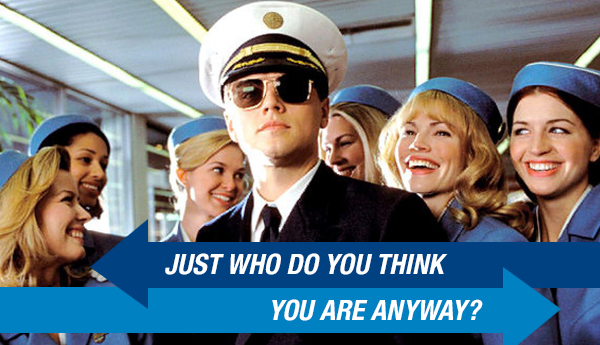You’ve experienced one of those people, haven’t you, that swaggers into a room like an imitation Donald Trump—just lacking the thinning dyed blonde comb-over hair. They have a sense of superiority as gold-plated as a cheap Atlantic City casino filled with quarter slot machines.
You don’t want to be that person, right? But just who do you think you are anyway?—nothing is more critical to your career and life.
The “Imposter Syndrome”—the Chronic Disease of the Almost Successful
Some of us fundamentally don’t believe we have the abilities that people attribute to us. That’s what’s called the “imposter syndrome.” You go into a meeting with a set of papers and notes dressed to the nines. You speak confidently and clearly, but in your mind you’re saying, “I hope this is working, because I don’t have a clue if I’m smart enough, skilled enough, or prepared to do my job.”
Several years ago I was introduced to a true imposter. Frank Abagnale was one of the most successful young con artists in history. I met him in the mid 1970’s soon after he completed a 5-year jail term. He had recently gone on the speaker’s circuit. By the time he turned 19 he had successfully portrayed himself as an airline pilot, a physician, and a county prosecutor in his quest to pass hot checks.
Faking it or Making it—How to Confuse Yourself and Everyone Around You
In those days I also wanted to cut a wider swath across history as a mystery writer, crime fighter, entrepreneur, circus juggler, rodeo bull rider, political figure, skydiver, televangelist, and general leader of men—and I thought I needed the acting skills to be these people. In fact, I often tried to be all those people at once—an odd combination of many people I’d known, admired, read about, or imagined, and I often ended up confusing other people–and myself especially.
I actually felt jealous of people like Frank Abagnale because of his natural ease, charm, and charisma. I was in my 30’s at the time and just trying to get my second career going. I was often ill at ease with myself and others. I wasn’t confident being me so that when I met you I tried to be who I thought you’d want me to be or someone that I thought you’d admire.
Abagnale, on the other hand, was poised and self-confident, wrote a book about his adventures in scamming the public, and then went on to become famous and was later the subject of the 2003 movie, Catch Me If You Can, starring Leonardo DiCaprio.
Becoming Who You Are to Become the Person You Can Be
I ultimately went on to have a successful career as a consultant/strategist/counselor, but I’ve had a running bout with identity crisis all my life—and it’s something many people face.
In many senses the journey to fit into the world means giving up ourselves. I think that we were given the fundamental instinct to want to be a part of a larger group—that’s why we’re always trying to fit it.
Yet I have come to the conclusion that our compulsion to check our personality at the door in order to fit into the group will enable us to “fit in,” but taken too far it will keep us from ever standing out.
Becoming Your Own Executive Coach
You are the best executive coach you will ever have for becoming your most effective self. Smart people use executive coaches who have good tools and insights—but you can ultimately become an authentic person who brings recognized value to the group.
How do I do that? Here are some suggestions:
1. See yourself as a person with potential and possibility. There is no person who has the ability to look at themselves who won’t get better by doing so.
2. It’s Critical to Take a Personal Inventory. What are my personal strengths and weaknesses? Am I competent in my profession? Can I relate well to the people who will make me successful? This is a good time to find a professional who can help you make a personal evaluation. Use tools such as MBTI® Step II, FIRO-B, 360-degree assessments, and all those assessments that give you insight.
3. Move Forward and Don’t Stop. If you have hit a point where the seas are choppy and the waves are getting higher, this is an excellent time to take a personal inventory and create a forward plan. Our personal pathway forward keeps us moving. Don’t stop.
PICTURED ABOVE: Leonardo DiCaprio as 19 year old Precocious Conman Frank Abagnale in the 2003 movie “Catch Me If You Can”






